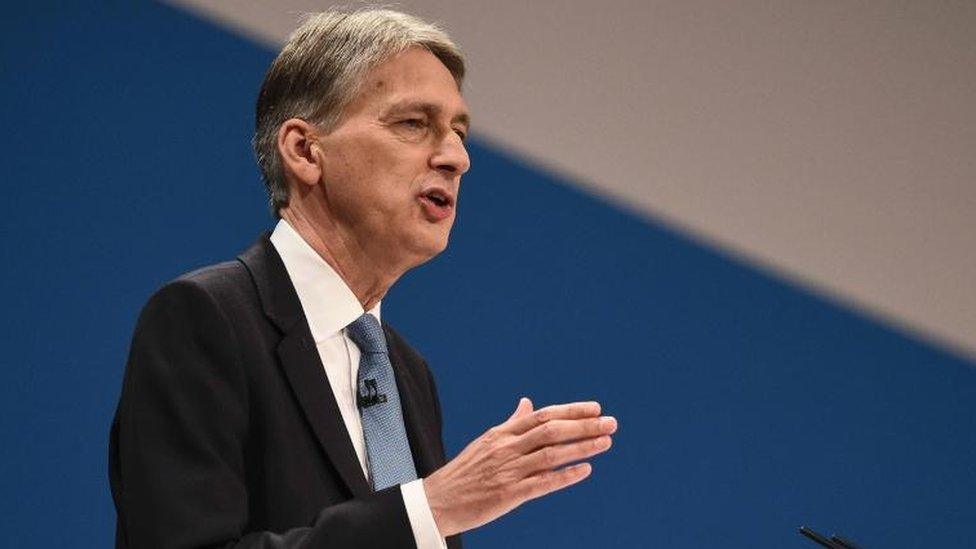Hammond: Austerity isn't over
- Published
- comments

This morning, the latest figures on the UK's manufacturing sector revealed another significant bounce upwards.
The manufacturing Purchasing Managers' Index - which surveys companies about the strength of their order books - saw an increase to 55.4.
Last month the figure was 53.4 - itself a significant increase compared with August. Any figure over 50 shows an expansion in the sector.
Philip Hammond's much quoted suggestion that Britain might be due a "fiscal reset" was predicated on there being grim economic news following the referendum.
Although the chancellor has made it clear it wants to retain "flexibility" in the way he approaches fiscal (tax and spending) policy, he also had another message today.
Ultimately, balancing the books is still the cornerstone of Conservative economic policy.
Yes, it may take longer and the government may have to borrow more because of fears over the impact of the Brexit referendum - and the chancellor shares those fears - but it is still the goal.
Balancing the books
I have been reminded time and again by those close to him - the chancellor is a "proper Conservative" when it comes to fiscal discipline.
"Fiscal reset" should never have been confused with a spending splurge, officials say, pointing out that Mr Hammond was one of the key architects of the Conservatives' original austerity plan in 2010.
The chancellor's speech today was peppered with references to credibility on the public finances, balancing the books and not returning, as the Conservatives see it, to the "tax and spend" ways of Labour.
Mr Hammond very deliberately kicked off his speech with a reminder of Liam Byrne's note that there was "no money left".
Mr Byrne was the Labour Chief Secretary to the Treasury before the 2010 election.
Mr Hammond denounced what he said were Labour's economic failures of the past, the clear message being that borrowing too much can only lead to one destination.
An economic mess.
He said that Labour's economic plans for the future were anchored in "la-la land".
And when it came to listing the challenges facing the UK, "dealing with the deficit" was the first, well ahead of "rebuilding our infrastructure".
As he looks towards the Autumn Statement on 23 November, Mr Hammond knows that the Office for Budget Responsibility, the official economic watchdog, is likely to have grim news on the state of the public finances.
Deficit reduction targets set at the Budget in March are likely to be missed, meaning that the debt being carried by the UK will be higher and growing for longer than expected.
Fiscal hawk
With such a warning ringing in the Treasury's ears, would that really be a time to announce significant amounts of new borrowing?
Particularly if growth is stronger than expected (the GDP - national income - figure for the third quarter of 2016 will be published at the end of the month).
And the Bank of England has cut interest rates again, as it may do at its next rate meeting on 3 November.
At this stage, and if the economic data continue to surprise on the upside, expect limited announcements on spending on infrastructure projects in November.
And don't forget we are about to get a decision on airport expansion in the south-east of England, which can be trumpeted as Britain "building for success", though, less noisily, with largely private money in this instance.
But the overall message of the new chancellor is clear.
The Conservatives want to balance the books and eliminate the deficit.
The referendum result means the original 2020 target date has been ditched.
But Mr Hammond is still, at heart, a fiscal hawk.